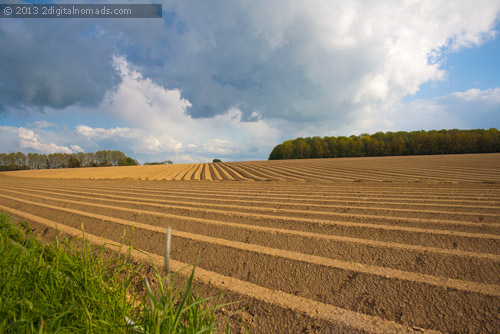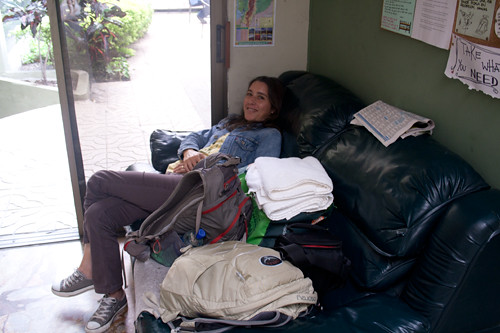12 Benefits of Travel that Will Change Your Mind
Posted by Ariane on Sep 9, 2013 in Countries, Planning | 2 comments
Summary: Why do people travel? Why do some of them travel and never stop traveling? There must be some benefit to traveling. An Arabic quote says that there are seven advantages to travel. We have found out that there are many more than that.
Don’t ever think that you will come back from a trip unchanged. In addition to the fact that you will learn a lot of things, travel changes you (in a good way!). Here are the main things that we’ve learned from our travels and how they have affected us.
There are many practical skills that you will have to learn while traveling (whether you like it or not). Otherwise you may screw up your trips and not enjoy them as much as you should.
1) Being organized:
Traveling teaches you how to be organized—beginning with your backpack! You need a minimum of organization to plan your trips.
2) Being patient:
You will learn how to be patient with yourself first because you are thrown into a totally unknown environment—so don’t expect to deal with situations as fast as you do at home. Then you will learn how to be patient with others, because you are a foreigner and locals are usually not used to dealing with strangers. You came to them, so you have to make an effort to be patient—you prepared your trip, but they might not be prepared to deal with you. They don’t speak your language, you barely speak theirs, and communication takes more time than normal. In the end, you will learn patience from the unpredictable events that will occur along the way (like delays, for example), in addition to the fact that in many countries people have a different sense of the time and may not be as punctual as you are.
3) Being brave:
Sometimes it is a bit scary to travel in a totally different country, and sometimes people can make you even more scared. You will learn to get over your fears and trust in your destiny.
4) Being flexible and adapting to a different system:
Each country has its own system for everything: labeling, directions, traffic, money, food, tips, banks, transportation… You will learn how to adapt to the country you’re traveling in. The faster you adapt, the less time you will waste and the more you will enjoy.
5) Learning languages:
If you’re not an English speaker, you will at least need some basics to travel in many countries. In other countries, people don’t speak English either, so you will have to learn some basics of their language. If you like languages, then you will probably enjoy the process of taking the opportunity to improve your skills and maybe learn one or two languages.
6) Learning how to deal with money:
If you want to enjoy your travels, you’ll need to plan a budget and deal with it. In other words, you’ll constantly need to make choices (unless you’re very rich and don’t even think about money!). You’ll need to count your money regularly to avoid bad surprises. You will also learn how to deal with different currencies, which is a good exercise for those who are not too good at calculations. Finally, you learn how to get good deals and how to save money while traveling.
These are a few of the practical things that travel teaches you—but this is not all. The experience of traveling has a much deeper impact on you and provides great benefits.
7) Learning to trust people:
It is very important for you to trust people. You don’t have any local knowledge in a country you know nothing about, so you need to trust people. Otherwise, you won’t do anything. Remember that most people are good, and only a few will try to take advantage of you. Trust is how you learn to know people and deal with them.
8) Knowing and loving our planet better:
Of course, nowadays you can see the world from your comfortable apartment through your HD TV flat screen without moving a finger or spending a cent. Programs will bring you beautiful images of our planet on a silver platter. But is there really a comparison between seeing a whale on TV and swimming next to one in the sea? TV doesn’t bring sensations, smells or connections. Once you see the world in real life; once you see the incredible diversity of animals, birds and plants; once you see the seas and the mountains, feel the wind and the sun and the rain on your skin, smell the forests and the desert, you become more aware of the fact that this is our home, and that it is so important to protect it and love it.
9) Understanding the world and its issues better:
What is true of nature and the environment is true of society, culture, politics and economics. Societies, politics and economies are different, but the world is quickly becoming one. Still, human rights are not respected everywhere. People are not treated the same everywhere. While traveling, you understand better the issues of the countries you’re visiting. You also understand better how the world works as a whole.
10) Questioning your own way of living by discovering other ways of life and other ways of thinking:
Seeing people acting differently, dealing differently and thinking differently makes you see your own country and culture in a different way (and maybe even question it). You see it from a distance now—but after traveling, you see things that were hidden from you before because you were too close to them. Seeing how people deal with life and death, relations, time and money makes you think about your own philosophy of living—and maybe you will change it!
11) Learning to love human beings regardless of their race, language, religion or culture:
People look different, but one thing we’ve learnt is that people are the same everywhere—they all have the same characteristics, and that’s what makes us human. And most of them are good.
12) Learning humility:
If you don’t learn humility, you won’t learn anything mentioned above. Let your travels teach you as if you knew nothing.








 Bassel & Ariane, a couple who quit their jobs to realize their dream "traveling around the world". This travel website is our way to share with you the amazing adventures we have had, with the goal of helping to make your own travels more enjoyable.
Bassel & Ariane, a couple who quit their jobs to realize their dream "traveling around the world". This travel website is our way to share with you the amazing adventures we have had, with the goal of helping to make your own travels more enjoyable.
This is by far, the best post i’ve read about traveling in a loong time, very simple and straight forward, made me realize why I love traveling in the first place too
Thanks Nagla, hope you enjoy your travels too 🙂